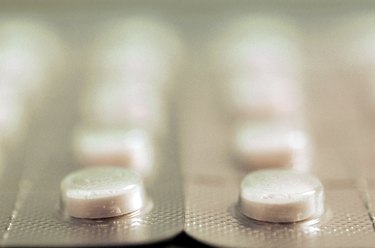
Antibiotics are drugs given to eliminate pathogenic, or disease-causing, bacteria from the body. They can be given in a number of ways, but outside the hospital they are almost always taken in oral form. Although these medications are never prescribed for weight loss, they can cause people to lose weight temporarily because of the effects they exert in the gastrointestinal tract and elsewhere in the body.
Gastrointestinal Effects
Video of the Day
A number of antibiotics -- including, but by no means limited to, those in the "-cillin" class -- can, in the course of eradicating offending bugs, disrupt the balance of normal or "good" bacteria in the gut and elsewhere. As these normal flora are helpful in maintaining homeostasis, or a normal, nondisrupted state, in the GI tract through their effects on acid-base balance and other microorganisms, perturbations in these colonies can lead to nausea, vomiting, diarrhea and other effects. Since these symptoms both decrease appetite and result in water loss, people who experience them often lose weight very rapidly. Of note is the fact that various infectious diseases themselves feature dehydration and loss of appetite as symptoms; this, in conjunction with an elevated metabolic rate associated with the body's immune response to invasion, can lead to weight loss independent of any antibiotic-induced effects.
Video of the Day
Metabolic Effects
While weight loss is a frequent short-term side effect of antibiotic use, studies reaching as far back as the middle of the 20th century suggest that the opposite effect may occur over the long haul. Dr. Thomas Haight stated in the January 1955 issue of the "Journal of Nutrition" that antibiotics administered to military recruits over a seven-week period resulted in statistically significant weight gain. As reported in the 2010 issue of "Time" magazine, certain normal bacteria in the gut play a major role in how ingested fat is stored in the body and that disruptions to these bacterial colonies as a result of antibiotic use may promote increased fat storage in humans and hence weight gain over time.
Hormonal effects
Through a cascade of physiological events, antibiotic use can have effects on hormones that participate in fuel storage. Hawaii physician Caroline Dean, a practitioner of both conventional and naturopathic medicine, states that antibiotics can cause an overgrowth of normal yeast; in their usual amounts these do not cause problems but when their numbers skyrocket they can leak into tissues in which they ordinarily are not found and lead to weight gain through both the stimulation of appetite and impairment of thyroid function. In addition, the March 2011 issue of "World Journal of Gastroenterology" notes that by reducing the number of H. pylori bacteria present in the stomach, activity of the at-storage hormone ghrelin is increased, potentially leading to weight gain.
- Journal of Nutrition: Effect of Prolonged Antibiotic Administration on the Weight of Healthy Young Males
- Medical News Today: What Are Antibiotics? How Do Antibiotics Work?
- Time Magazine: A Hidden Trigger of Obesity: Intestinal Bugs
- JigsawHealth.com: Yeast and Weight Gain
- World Journal of Gastroenterology: Endocrine Impact of Helicobacter Pylori: Focus on Ghrelin and Ghrelin O-acyltransferase